Managing web servers efficiently requires the right tools, and that’s where Open Source Hosting Control Panels come into play. These powerful and flexible solutions provide a user-friendly interface to handle tasks such as website management, email configuration, DNS settings, and server resource monitoring. Unlike proprietary control panels, open-source options are cost-effective, customizable, and backed by active communities that ensure constant updates and improvements.
In this blog, we’ll explore the Top 11 Open Source Hosting Control Panels that can help you streamline server management while offering robust features, high compatibility, and enhanced security. Whether you’re a web hosting provider, developer, or system administrator, there’s a solution here to meet your needs. Let’s dive in!
Table of Contents
- Top 11 Open Source Hosting Control Panels
- 1. CloudPanel
- 2. HestiaCP Control Panel
- 3. CyberPanel
- 4. aaPanel
- 5. CentOS Web Panel (CWP)
- 6. Virtualmin
- 7. ISPConfig
- 8. Froxlor
- 9. VestaCP
- 10. Ajenti
- 11. KeyHelp
- MagnetByte’s Top Picks from the 11 Best Open Source Hosting Control Panels
- Feature Comparison of Top Open Source Hosting Control Panels
Top 11 Open Source Hosting Control Panels
1. CloudPanel

CloudPanel is a modern, lightweight, and efficient server control panel designed for managing web applications and services, optimized for high-performance environments.
Key Features of CloudPanel
- User-Friendly Interface: Intuitive and modern dashboard for managing server resources and applications.
- Application Support: Easily deploy popular applications like WordPress, Laravel, and static websites.
- Performance Optimization: Built-in NGINX configuration for high-speed delivery.
- Database Management: Supports MariaDB, MySQL, and Redis databases.
- Security: Automatic SSL certificate integration with Let’s Encrypt and advanced security features.
- Resource Monitoring: Real-time monitoring of server resources, including CPU, RAM, and disk usage.
- Multi-PHP Support: Run different PHP versions per application (PHP 7.4 to PHP 8.x).
- Command Line Integration: Powerful CLI for advanced server management.
- Staging and Cloning: Easily create staging environments for development and testing.
Pros
- Performance-Oriented: Optimized for high-performance web applications using NGINX and PHP-FPM.
- Lightweight: Minimal resource usage compared to heavier control panels like cPanel.
- Free to Use: Open-source and free for commercial and personal use.
- Ease of Installation: Quick installation on supported operating systems.
- Built-in Security: Free SSL certificates and automatic security updates.
- Developer-Friendly: Supports Git deployments and SSH access.
- Docker Integration: Supports container-based applications.
Cons
- Limited OS Support: Only supports Debian-based systems (Debian and Ubuntu).
- No cPanel-style Email Management: Email server features are not natively integrated.
- Limited Third-Party Integrations: Fewer third-party app integrations compared to cPanel.
- Smaller Community: Compared to older control panels like cPanel or Plesk.
Supported Operating Systems
| Operating System | Supported Versions | Architecture |
|---|---|---|
| Debian | 10 (Buster), 11 (Bullseye) | x86_64 (64-bit) |
| Ubuntu | 20.04 LTS, 22.04 LTS | x86_64 (64-bit) |
Note: CloudPanel is optimized for 64-bit architectures and does not support 32-bit systems.
Use Cases
- Ideal for developers and agencies looking to manage high-performance websites.
- Suitable for WordPress hosting environments.
- Excellent choice for resource-constrained cloud instances.
Read Also | 6 Top Hosting Providers of 2025: Find the Perfect Fit for Your Website!
2. HestiaCP Control Panel
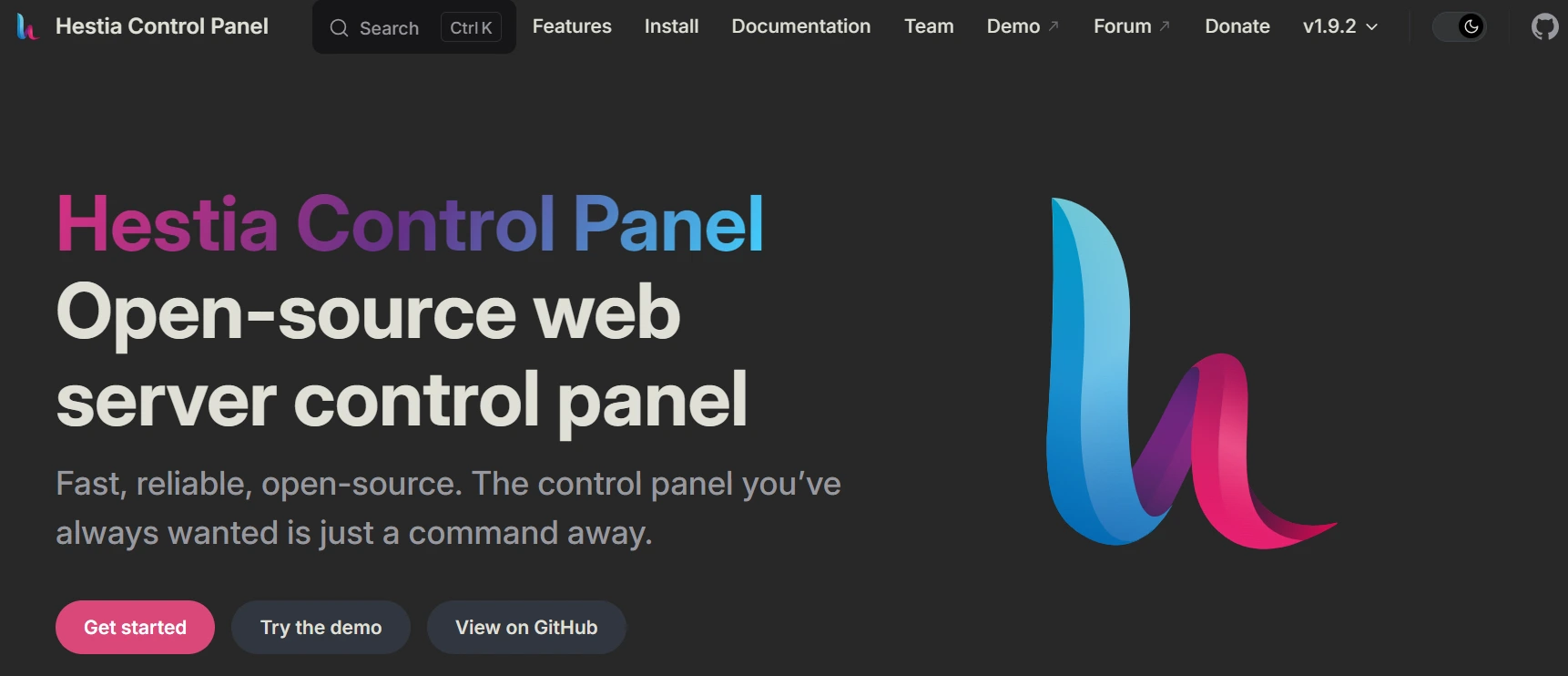
HestiaCP is a powerful, lightweight, and open-source web hosting control panel built for simplicity and performance. It is a fork of the popular VestaCP, offering a modern interface and additional security features.
Key Features of HestiaCP
- User-Friendly Web Interface: Clean and modern dashboard for managing server resources and websites.
- Multi-Domain Support: Manage multiple domains, subdomains, and DNS records.
- Web Server Management: Supports NGINX, Apache, and PHP-FPM for flexible configurations.
- Database Management: Manage MySQL and PostgreSQL databases.
- Email Server: Full email stack with Dovecot, Exim, and SpamAssassin.
- SSL Management: Free Let’s Encrypt SSL certificates with automatic renewal.
- Backup and Restore: Built-in backup system for websites, databases, and configuration files.
- Security Features: Built-in firewall with Fail2Ban support and IP blocking.
- Multi-PHP Support: Allows running different PHP versions per domain.
Pros
- Open-Source & Free: No licensing costs, fully open-source.
- Lightweight: Optimized for minimal resource usage.
- Comprehensive Features: Covers web, database, and email management.
- Customizable: Easily extend functionality with shell commands and configuration tweaks.
- Built-in Security: Includes robust security features by default.
- Backup System: Reliable and easy-to-use backup/restore mechanism.
Cons
- Limited Community Support: Smaller community compared to cPanel or Plesk.
- Less Polished Interface: UI may feel less modern compared to some competitors.
- No Windows Support: Available only for Linux-based systems.
- Steeper Learning Curve: May require some Linux knowledge for advanced configurations.
Supported Operating Systems
| Operating System | Supported Versions | Architecture |
|---|---|---|
| Debian | 10 (Buster), 11 (Bullseye) | x86_64 (64-bit) |
| Ubuntu | 18.04 LTS, 20.04 LTS, 22.04 LTS | x86_64 (64-bit) |
Note: HestiaCP is optimized for 64-bit architectures only and requires a clean server installation.
Use Cases
- Suitable for small to medium-sized web hosting environments.
- Ideal for developers who prefer a lightweight, free control panel.
- Great for managing personal projects or small business websites.
3. CyberPanel
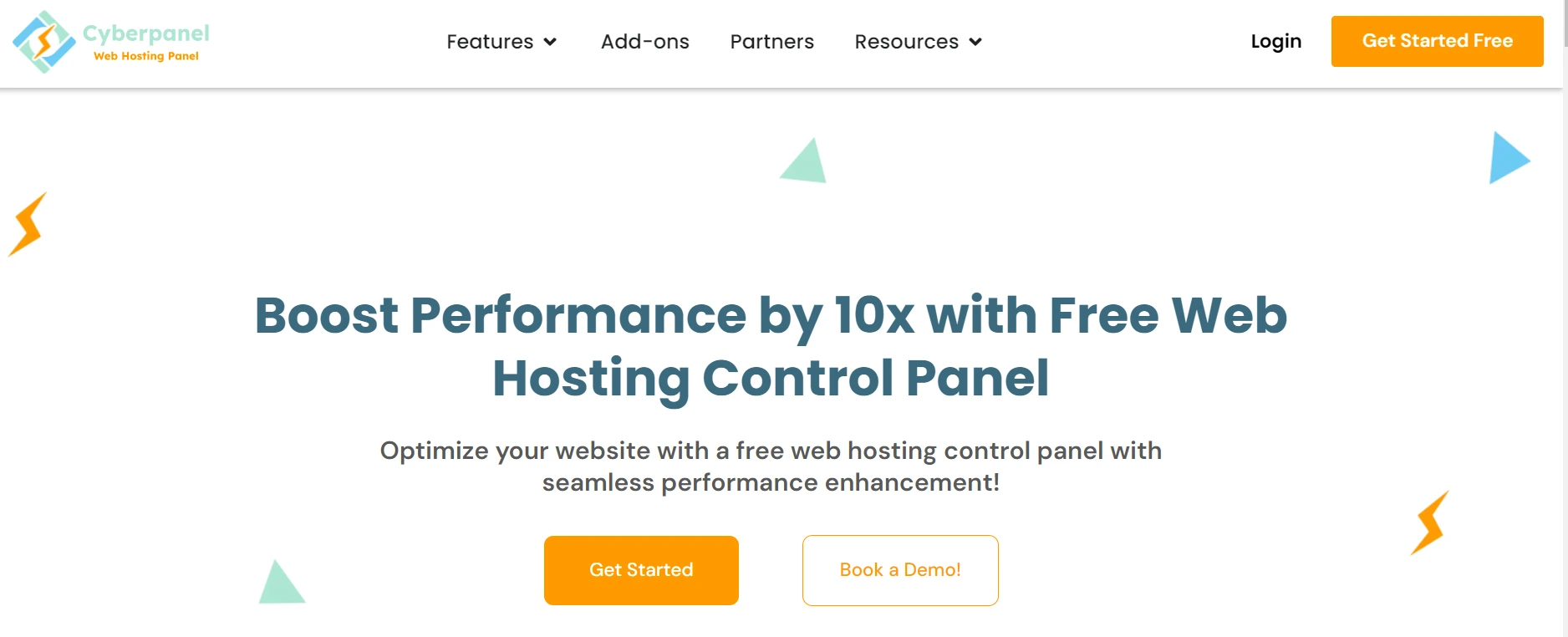
CyberPanel is a next-generation, feature-rich web hosting control panel powered by OpenLiteSpeed and LiteSpeed Enterprise. It offers a modern, easy-to-use interface with advanced features, making it ideal for high-performance web hosting environments.
Key Features of CyberPanel
- OpenLiteSpeed & LiteSpeed Support: Native integration with OpenLiteSpeed (free) and LiteSpeed Enterprise (premium).
- One-Click Application Installer: Easily deploy WordPress, Joomla, and other applications.
- LSCache Integration: Built-in LSCache support for faster website performance.
- Docker Manager: Manage Docker containers directly from the panel.
- Email Management: Fully functional email server with Postfix and RainLoop Webmail.
- Database Management: MariaDB with phpMyAdmin support.
- Security Features: Built-in firewall, ModSecurity, and automatic SSL certificates with Let’s Encrypt.
- Backup & Restore: Efficient backup and restore options for websites and data.
- DNS Management: Built-in DNS management for domain configuration.
- Staging & Cloning: Easily create staging environments for testing changes.
Pros
- Performance-Oriented: Optimized for high-speed website delivery using LiteSpeed technology.
- User-Friendly Interface: Modern and clean UI for efficient server management.
- One-Click WordPress Installer: Easy deployment with LSCache integration.
- Free & Premium Options: OpenLiteSpeed (free) and LiteSpeed Enterprise (paid) options.
- Security Features: Automatic SSL, ModSecurity, and advanced server protections.
- Docker Support: Manage containerized applications directly.
- Backup Flexibility: Supports cloud backups to services like AWS and Google Drive.
Cons
- Resource Intensive: Higher resource usage compared to NGINX-based panels.
- LiteSpeed Enterprise Costs: To unlock full features, LiteSpeed Enterprise requires a license.
- Occasional Bugs: Some users report occasional stability issues.
- Limited OS Support: Supports only CentOS, Ubuntu, and Almalinux.
Supported Operating Systems
| Operating System | Supported Versions | Architecture |
|---|---|---|
| CentOS | 7, 8 | x86_64 (64-bit) |
| Ubuntu | 18.04, 20.04, 22.04 | x86_64 (64-bit) |
| AlmaLinux | 8.x | x86_64 (64-bit) |
Use Cases
- Ideal for WordPress hosting environments seeking fast, optimized performance.
- Suitable for hosting companies that want a powerful and scalable panel.
- Great for developers who need Docker container management.
4. aaPanel
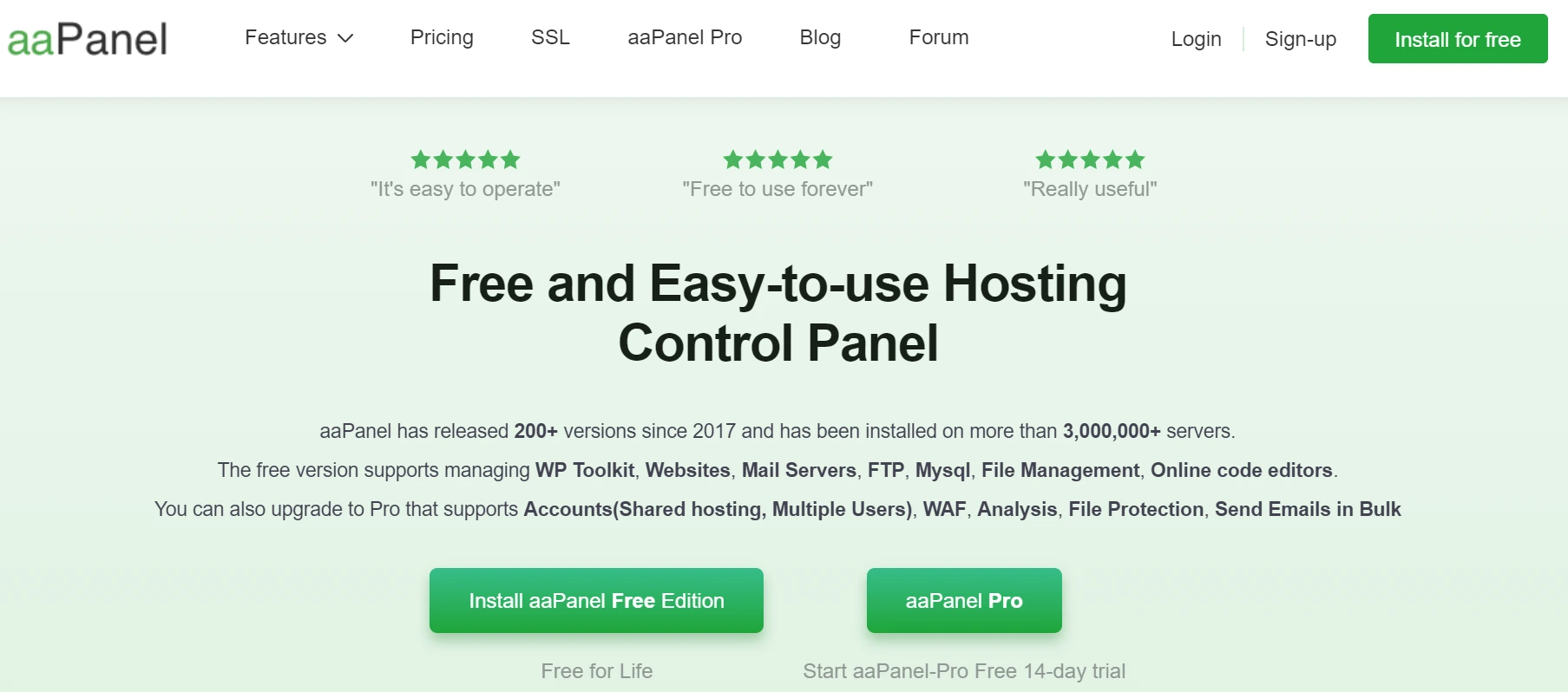
aaPanel is a free, user-friendly web hosting control panel designed for efficient server management. It provides an intuitive graphical interface for managing websites, databases, email, and other server functions.
Key Features of aaPanel
- One-Click Environment Setup: Easily deploy LNMP/LAMP (Linux, NGINX/Apache, MySQL, PHP) stacks.
- Web Server Support: NGINX, Apache, and OpenLiteSpeed support.
- Database Management: MySQL, MariaDB, and PostgreSQL support with phpMyAdmin integration.
- Application Store: One-click installation of popular applications like WordPress, Joomla, and more.
- File Manager: Intuitive file manager for handling server files.
- Email Management: Full email server stack (Postfix, Dovecot) with RainLoop Webmail.
- Security Features: Built-in firewall, Fail2Ban, and Let’s Encrypt SSL support.
- Performance Monitoring: Real-time monitoring of CPU, RAM, and disk usage.
- Backup Management: Supports local and remote (Amazon S3, Google Drive) backups.
- Task Scheduler: Automate routine server tasks with cron jobs.
Pros
- Free & Open Source: No licensing fees for core functionality.
- Easy to Use: Intuitive graphical interface with minimal learning curve.
- Flexible Web Server Options: Choose between NGINX, Apache, or OpenLiteSpeed.
- Security Features: Built-in firewall and security tools.
- Comprehensive Management Tools: File manager, database manager, and task scheduler.
- Application Marketplace: Easily install and manage applications.
Cons
- Limited Community Support: Smaller community compared to cPanel or Plesk.
- Resource Usage: Slightly heavier compared to ultra-light panels like CloudPanel.
- Potential Security Risks: Third-party plugins may introduce vulnerabilities if not properly vetted.
- No Native Docker Support: Docker requires manual configuration.
Supported Operating Systems
| Operating System | Supported Versions | Architecture |
|---|---|---|
| CentOS | 7, 8 | x86_64 (64-bit) |
| Ubuntu | 18.04, 20.04, 22.04 | x86_64 (64-bit) |
| Debian | 9, 10, 11 | x86_64 (64-bit) |
| AlmaLinux | 8.x | x86_64 (64-bit) |
Note: Requires a clean server installation and is optimized for 64-bit architectures.
Use Cases
- Ideal for small to medium-sized web hosting environments.
- Suitable for developers and agencies managing multiple web projects.
- Great for those seeking a free, powerful alternative to paid control panels.
Read Also | Top 10 Free Hosting Providers of 2025: Your Ultimate Guide
5. CentOS Web Panel (CWP)
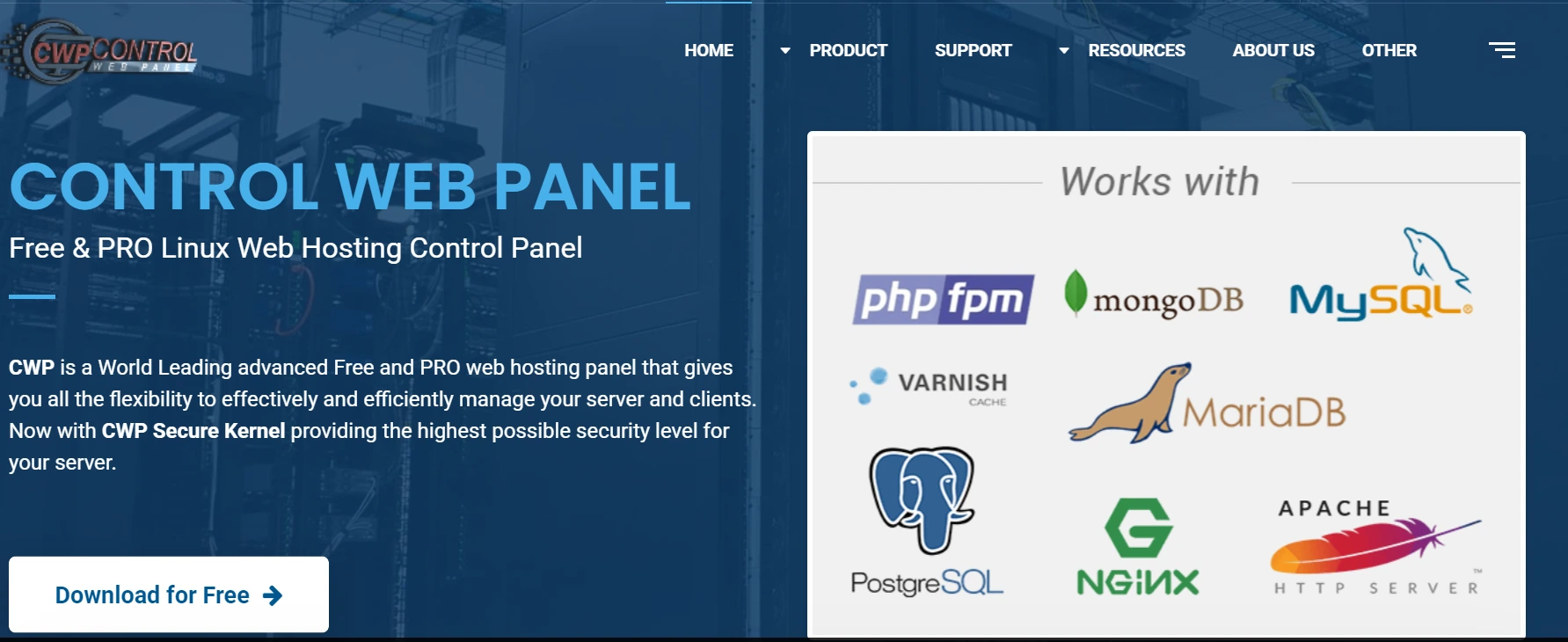
CentOS Web Panel (CWP) is a free web hosting control panel designed specifically for CentOS, AlmaLinux, and Rocky Linux. It provides a user-friendly interface for managing web servers and hosting environments, making server administration simple for both developers and hosting providers.
Key Features of CentOS Web Panel (CWP)
- Web Server Management: Supports Apache, NGINX, and Varnish Cache for high-performance setups.
- Database Management: Integrated MySQL and MariaDB with phpMyAdmin.
- Email Server: Complete email stack with Postfix, Dovecot, and Roundcube webmail.
- Security Features: Built-in firewall, CSF (ConfigServer Security & Firewall), ModSecurity, and Fail2Ban.
- Backup Solutions: Automated backup tools for website and database recovery.
- User Account Management: Create and manage multiple user accounts for shared hosting.
- File Management: Web-based file manager with upload and edit functions.
- SSL Management: Free Let’s Encrypt SSL certificates for secure websites.
- Resource Monitoring: Real-time monitoring of server resources like CPU, RAM, and disk usage.
- Softaculous Integration: One-click application installer (premium feature).
Pros
- Free & Paid Versions: Free version offers essential features, while CWP Pro provides advanced options at an affordable price.
- Robust Security: Built-in tools for enhanced server security.
- Comprehensive Server Management: Manages web, email, DNS, and database services efficiently.
- Lightweight: Optimized for minimal resource usage.
- Easy Migration: Tools for migrating cPanel accounts to CWP.
Cons
- CentOS Dependency: Initially tied to CentOS, but now supports newer RHEL-based distros.
- Steeper Learning Curve: Advanced features may require some server management expertise.
- Community Support: Smaller community compared to cPanel and Plesk.
- Limited OS Support: Not as versatile as some alternatives in supporting non-RHEL distributions.
Supported Operating Systems
| Operating System | Supported Versions | Architecture |
|---|---|---|
| CentOS | 7.x | x86_64 (64-bit) |
| AlmaLinux | 8.x, 9.x | x86_64 (64-bit) |
| Rocky Linux | 8.x, 9.x | x86_64 (64-bit) |
| Red Hat Enterprise Linux (RHEL) | 8.x, 9.x | x86_64 (64-bit) |
Use Cases
- Ideal for hosting providers and system administrators managing multiple websites.
- Suitable for shared hosting environments.
- Great for developers looking for a cPanel alternative without high licensing fees.
6. Virtualmin
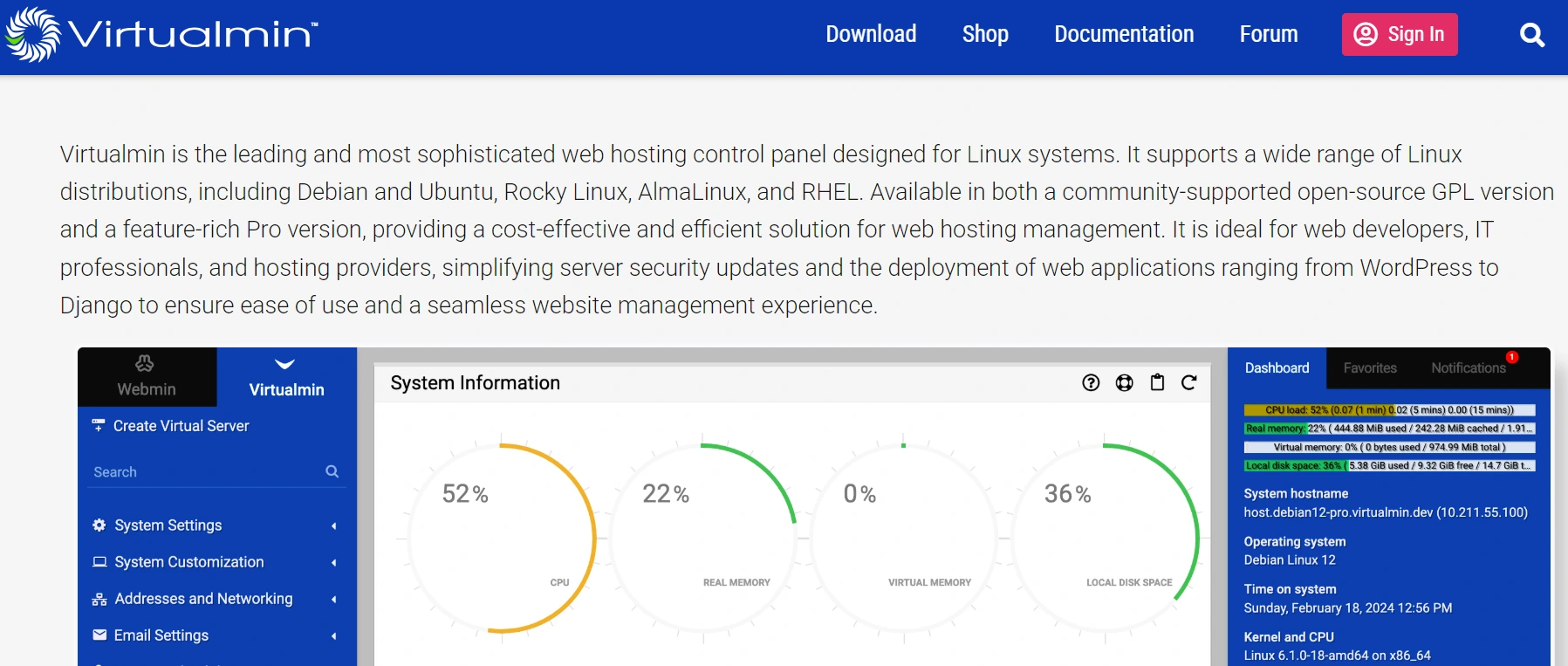
Virtualmin is a powerful, flexible, and open-source web hosting control panel built on top of Webmin. It allows users to manage multiple virtual hosts, domains, websites, databases, and mailboxes with ease. Available in both free (GPL) and paid (Pro) versions, Virtualmin is a popular choice for developers and hosting providers.
Key Features of Virtualmin
- Web Server Management: Supports Apache and NGINX for flexible server configurations.
- Domain and Virtual Server Management: Easily manage multiple domains and virtual servers.
- Email Management: Full email server stack with Postfix, Dovecot, and SpamAssassin integration.
- Database Management: Supports MySQL, MariaDB, and PostgreSQL.
- Security Features: Let’s Encrypt SSL, IP access control, and automatic updates.
- Integrated Backup System: Automated backup and restoration options.
- DNS Management: Built-in DNS server (BIND) configuration tools.
- Package Management: Install and update packages using YUM or APT.
- User Management: Fine-grained control over user accounts and permissions.
- Command Line Interface (CLI): Advanced users can automate tasks via CLI.
Pros
- Free and Open Source: Fully functional free version (GPL).
- Highly Configurable: Extensive customization options for advanced users.
- Comprehensive Features: Handles web, email, DNS, and database management.
- Secure: SSL management and built-in security features.
- Resource Efficient: Lightweight compared to some other panels.
- Pro Version: Affordable paid version with additional features.
Cons
- Complex Interface: Steeper learning curve for beginners.
- Not as User-Friendly: Interface may feel dated compared to modern control panels.
- Limited Community Support: Smaller community than cPanel or Plesk.
- Performance Impact: Slightly resource-heavy on low-spec servers.
Supported Operating Systems
| Operating System | Supported Versions | Architecture |
|---|---|---|
| CentOS | 7, 8 | x86_64 (64-bit) |
| AlmaLinux | 8.x, 9.x | x86_64 (64-bit) |
| Rocky Linux | 8.x, 9.x | x86_64 (64-bit) |
| Debian | 9, 10, 11 | x86_64 (64-bit) |
| Ubuntu | 18.04, 20.04, 22.04 | x86_64 (64-bit) |
Note: Virtualmin supports both RHEL-based and Debian-based distributions.
Use Cases
- Ideal for developers managing multiple domains and services.
- Suitable for businesses hosting websites, databases, and email services.
- Great for advanced users who need extensive configuration options.
7. ISPConfig
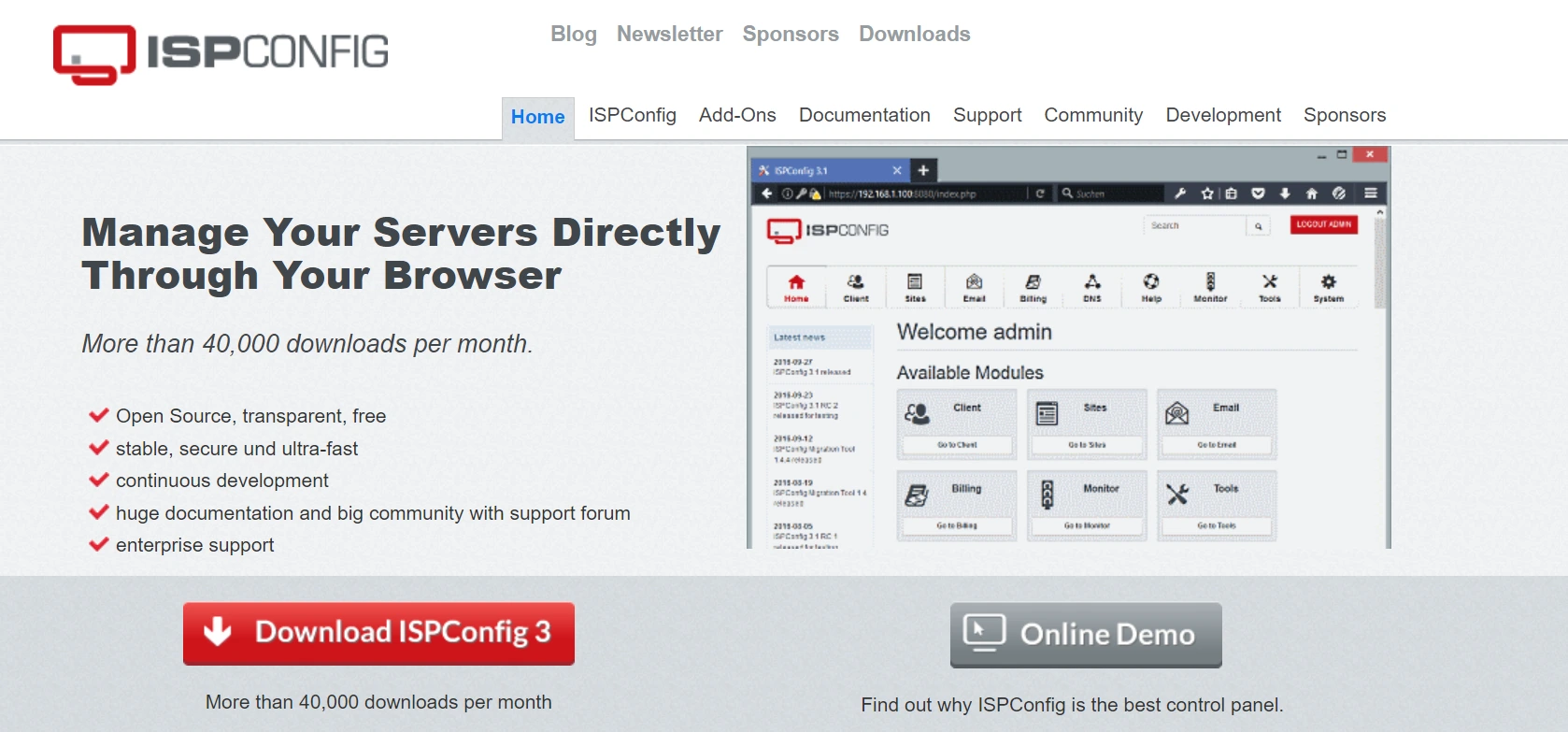
ISPConfig is a free, open-source hosting control panel designed for Linux servers. It allows you to manage multiple services like web servers, databases, DNS, email, and virtual hosting. ISPConfig supports single and multi-server configurations, making it a versatile choice for web hosting providers.
Key Features of ISPConfig
- Multi-Server Support: Manage multiple servers from a single control panel.
- Web Server Management: Supports Apache and NGINX.
- Database Management: MySQL and MariaDB with phpMyAdmin integration.
- Email Server Management: Postfix, Dovecot, and SpamAssassin for secure email services.
- DNS Management: Built-in support for BIND and PowerDNS.
- FTP Server Integration: Supports PureFTPD and ProFTPD.
- SSL Management: Let’s Encrypt integration for automatic SSL certificate issuance.
- Multi-Language Support: Available in multiple languages.
- User Roles: Admin, reseller, and client roles with role-based access control.
- Virtualization Integration: Supports OpenVZ and KVM virtual machines.
- Backup Management: Automated backups for websites and databases.
Pros
- Free and Open Source: No licensing costs.
- Comprehensive Features: Manages web, DNS, email, and database services.
- Multi-Server Support: Ideal for large hosting environments.
- Secure: Built-in SSL and security features.
- Scalable: Suitable for both small and large hosting setups.
- Lightweight: Minimal resource usage compared to heavy panels like cPanel.
Cons
- Complex Setup: Installation and configuration can be challenging for beginners.
- Outdated Interface: UI is functional but lacks modern design elements.
- Limited Community Support: Smaller user base compared to cPanel or Plesk.
- Learning Curve: Advanced features may require technical expertise.
- No One-Click Application Installer: Lacks features like Softaculous for easy app deployment.
Supported Operating Systems
| Operating System | Supported Versions | Architecture |
|---|---|---|
| Debian | 9, 10, 11 | x86_64 (64-bit) |
| Ubuntu | 18.04, 20.04, 22.04 | x86_64 (64-bit) |
| CentOS | 7 | x86_64 (64-bit) |
| AlmaLinux | 8.x | x86_64 (64-bit) |
| Rocky Linux | 8.x | x86_64 (64-bit) |
Note: Requires a clean server installation and works best on Debian-based distributions.
Use Cases
- Ideal for web hosting providers managing multiple clients.
- Suitable for developers and system administrators managing multiple servers.
- Great for businesses seeking a cost-effective, scalable hosting solution.
8. Froxlor
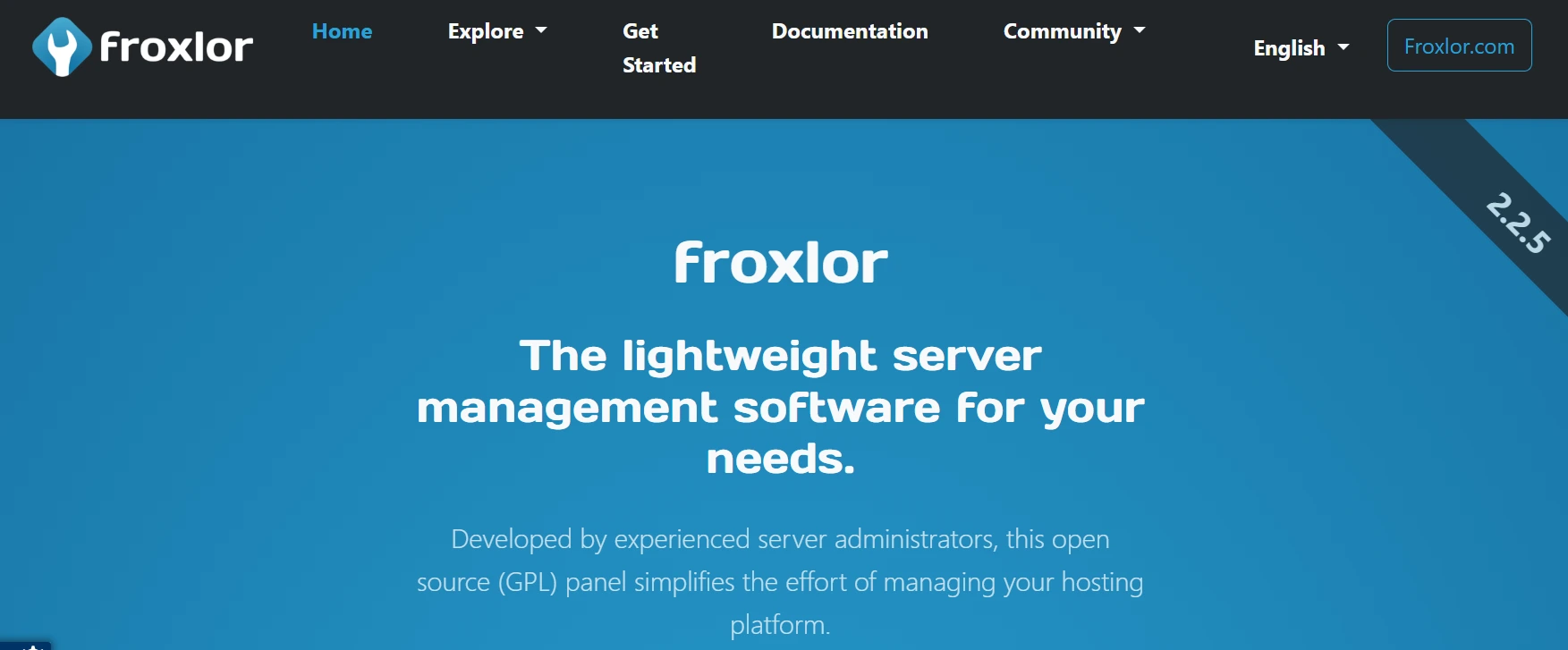
Froxlor is a lightweight, open-source server management panel for Linux, designed for web hosting environments. It offers a simple interface for managing web servers, email, DNS, and database services. Froxlor is ideal for small hosting providers and developers looking for a minimal yet effective control panel.
Key Features of Froxlor
- Web Server Management: Supports Apache and NGINX with customizable configuration templates.
- Database Management: Integration with MySQL and MariaDB, along with phpMyAdmin support.
- Email Server: Manages Postfix, Dovecot, and advanced email features like quotas and spam filters.
- DNS Management: Built-in DNS management tools.
- SSL Support: Let’s Encrypt integration for automated SSL certificate issuance.
- Resource Monitoring: Track server resource usage, including bandwidth and storage.
- Multi-User Management: Supports administrator, reseller, and client roles.
- Backup Management: Automated website and database backup options.
- IPv6 Support: Full support for IPv6 configurations.
- Customizable Branding: White-labeling options for resellers.
Pros
- Lightweight: Minimal resource usage, ideal for low-spec servers.
- Free and Open Source: No licensing costs.
- Simple Interface: Easy-to-use web interface for beginners.
- Secure: Let’s Encrypt SSL and security features built-in.
- Customizable: Flexible configuration options for advanced users.
- Efficient Resource Monitoring: Detailed bandwidth and disk usage reports.
Cons
- Limited Community Support: Smaller community compared to larger panels like cPanel or Virtualmin.
- Lacks Advanced Features: No built-in one-click app installer like Softaculous.
- Basic UI: Interface may feel outdated compared to modern panels.
- Manual Setup: Requires manual configuration for some services.
- No Multi-Server Management: Best suited for single-server environments.
Supported Operating Systems
| Operating System | Supported Versions | Architecture |
|---|---|---|
| Debian | 9, 10, 11 | x86_64 (64-bit) |
| Ubuntu | 18.04, 20.04, 22.04 | x86_64 (64-bit) |
| AlmaLinux | 8.x | x86_64 (64-bit) |
| Rocky Linux | 8.x | x86_64 (64-bit) |
| RHEL | 8.x | x86_64 (64-bit) |
Note: Froxlor works best on Debian-based systems but also supports RHEL-based distributions.
Use Cases
- Ideal for small web hosting providers.
- Suitable for developers managing personal or small business websites.
- Great for low-resource environments like VPS hosting.
9. VestaCP
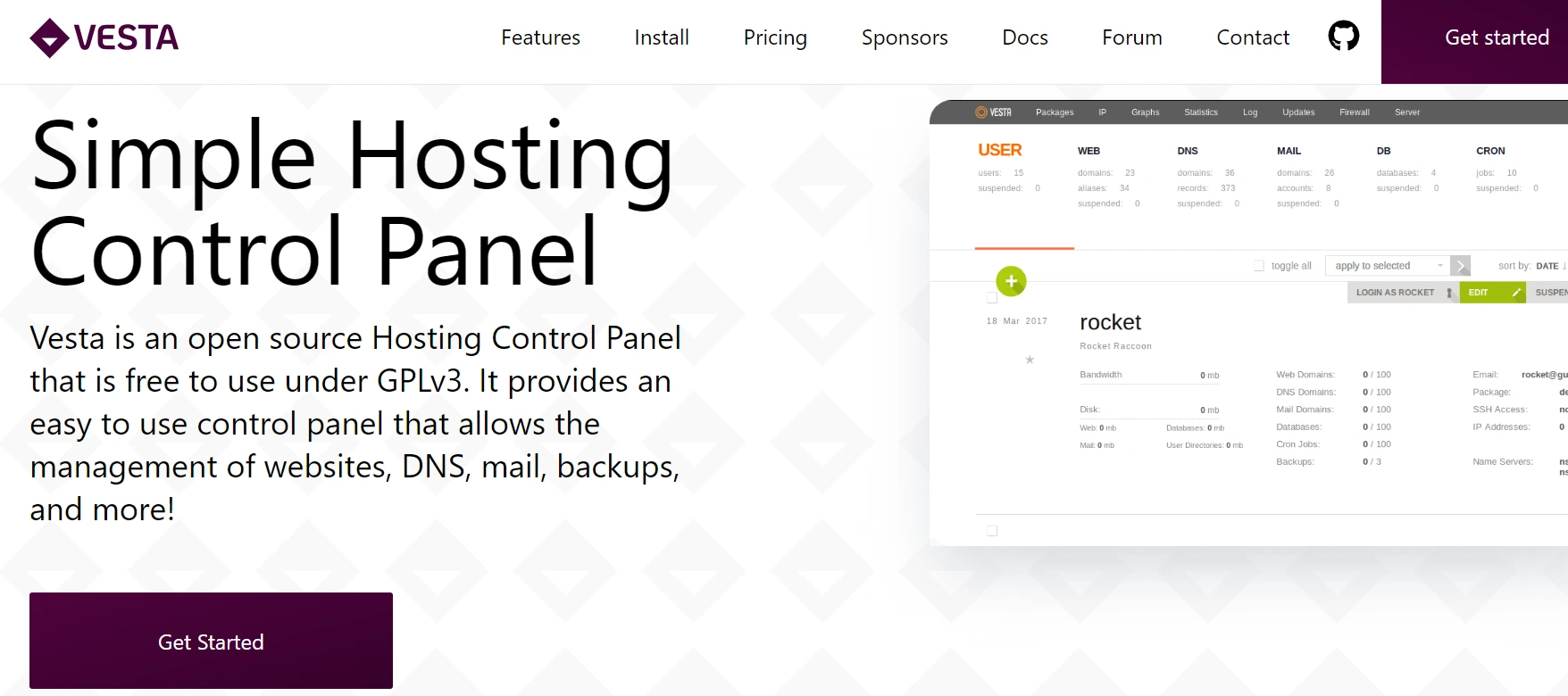
VestaCP is a free, open-source web hosting control panel known for its simplicity and lightweight nature. It offers a user-friendly interface with a focus on speed and efficiency, making it ideal for small to medium hosting environments. VestaCP supports all essential server management tasks, including website, email, and database management.
Key Features of VestaCP
- Web Server Management: Supports Apache and NGINX (can be configured as a reverse proxy).
- Database Management: Built-in support for MySQL and MariaDB with phpMyAdmin.
- Email Server Integration: Postfix, Dovecot, and SpamAssassin for secure email services.
- DNS Management: Built-in DNS server configuration with Bind.
- SSL Support: Automated Let’s Encrypt SSL certificate management.
- Backup System: Scheduled backups for websites, databases, and configurations.
- User Roles: Admin, reseller, and user roles with customizable permissions.
- Monitoring Tools: Built-in resource monitoring for server statistics and logs.
- Command Line Interface (CLI): Advanced users can manage tasks via the CLI.
- Firewall Integration: Supports IPtables and fail2ban for added security.
Pros
- Free and Open Source: No licensing fees.
- Lightweight: Minimal resource usage, making it ideal for low-spec servers.
- Easy to Use: Clean and straightforward user interface.
- Secure: Built-in firewall and SSL management.
- Backup Functionality: Automatic backup system included.
- Fast Setup: Quick and simple installation process.
Cons
- Limited Community Support: Smaller community compared to cPanel or Plesk.
- No Multi-Server Support: Best suited for single-server environments.
- Outdated Interface: UI lacks modern design elements.
- Email Handling Issues: Sometimes unstable with large email setups.
- No Built-in One-Click Installer: Requires manual app installations.
Supported Operating Systems
| Operating System | Supported Versions | Architecture |
|---|---|---|
| CentOS | 6, 7 | x86_64 (64-bit) |
| Ubuntu | 18.04, 20.04 | x86_64 (64-bit) |
| Debian | 9, 10 | x86_64 (64-bit) |
Note: VestaCP works best on CentOS and Ubuntu but supports Debian as well.
Use Cases
- Ideal for small to medium-sized hosting providers.
- Suitable for personal or small business websites.
- Great for developers seeking a lightweight and simple control panel.
10. Ajenti

Ajenti is a lightweight and modern web-based control panel for server management. It features an intuitive interface and offers a modular architecture for extending its capabilities. Ajenti is particularly suited for developers and system administrators who prefer a fast, responsive interface without the resource-heavy demands of traditional control panels.
Key Features of Ajenti
- Web Server Management: Supports NGINX and Apache web servers.
- Database Integration: Works with MySQL, MariaDB, and PostgreSQL.
- Email Management: Provides integration with Postfix and Dovecot.
- Modular Architecture: Extend functionality with plugins for DNS, file management, and more.
- Built-in Terminal: Access a full-featured terminal from the control panel.
- Resource Monitoring: Real-time resource usage tracking (CPU, memory, disk, and network).
- User Management: Create and manage multiple user accounts with role-based access.
- SSL Management: Manual SSL configuration with Let’s Encrypt support available via plugins.
- Responsive UI: Clean and modern design with mobile-friendly interface.
- Developer-Friendly: Ideal for custom server setups and lightweight management.
Pros
- Lightweight: Minimal resource consumption, ideal for low-spec VPS servers.
- Modern Interface: Clean, responsive design with an excellent user experience.
- Extensible: Highly customizable with plugins.
- Built-in Terminal: Convenient for server administrators.
- Multi-Distribution Support: Works with various Linux distributions.
Cons
- Limited Out-of-the-Box Features: Requires plugins for advanced functionality.
- Smaller Community: Less widespread support compared to larger panels.
- Manual SSL Setup: No automatic Let’s Encrypt integration by default.
- No Multi-Server Support: Best suited for single-server environments.
Supported Operating Systems
| Operating System | Supported Versions | Architecture |
|---|---|---|
| Debian | 9, 10, 11 | x86_64 (64-bit) |
| Ubuntu | 16.04, 18.04, 20.04, 22.04 | x86_64 (64-bit) |
| RHEL/CentOS | 7, 8 | x86_64 (64-bit) |
| AlmaLinux | 8.x | x86_64 (64-bit) |
| Rocky Linux | 8.x | x86_64 (64-bit) |
Note: Works best with Ubuntu and Debian-based systems.
Use Cases
- Ideal for developers and system administrators needing a lightweight control panel.
- Suitable for personal VPS setups.
- Best for custom server environments where modularity is essential.
11. KeyHelp
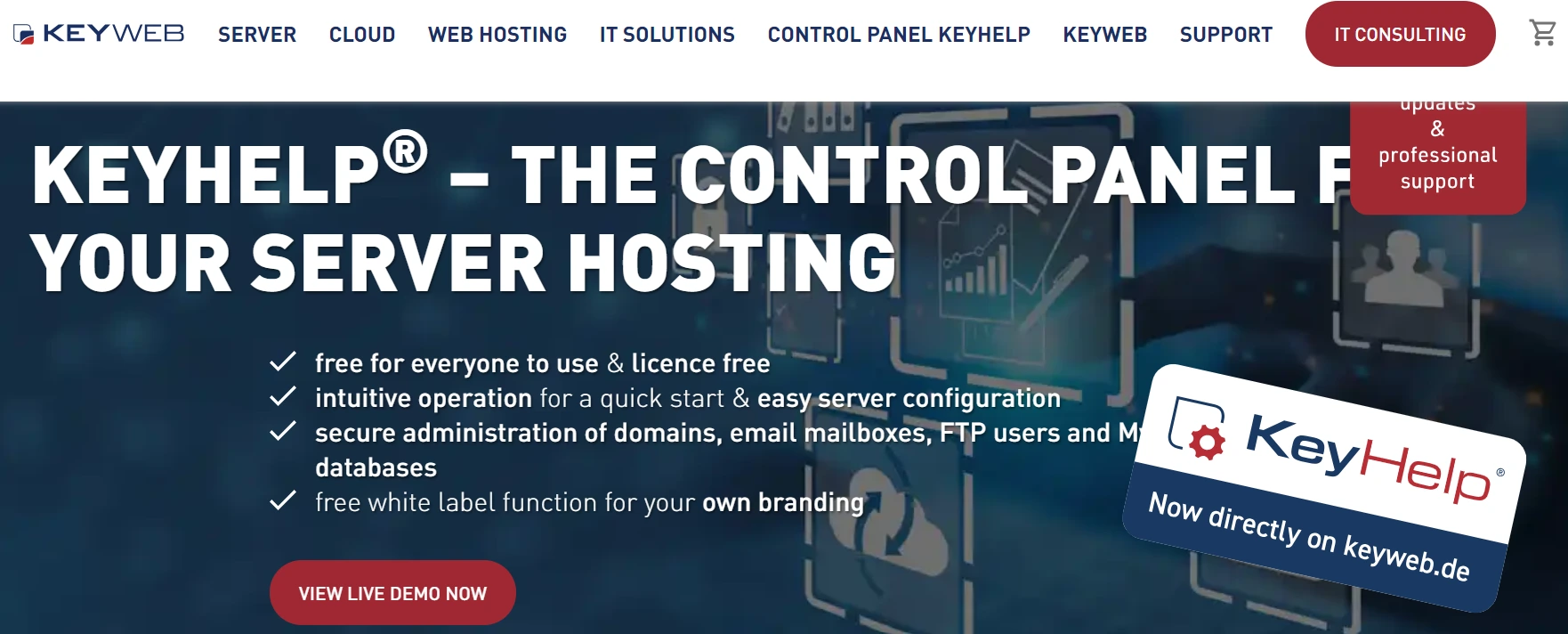
KeyHelp is a free, feature-rich web hosting control panel designed for Linux servers. Developed by Keyweb AG, it provides a secure, user-friendly environment for managing websites, email services, databases, and server configurations. KeyHelp is suitable for both beginners and experienced administrators seeking a robust and modern control panel.
Key Features of KeyHelp
- Web Server Management: Supports Apache and NGINX (as a reverse proxy).
- Database Management: MySQL, MariaDB, and phpMyAdmin integration.
- Email Management: Postfix, Dovecot, and SpamAssassin for spam protection.
- SSL Management: One-click Let’s Encrypt SSL certificate installation.
- User Roles: Admin, reseller, and user roles with granular access control.
- Backup System: Automated and manual backups for websites and databases.
- Resource Monitoring: Built-in resource monitoring for CPU, RAM, and disk usage.
- Security Features: Firewall configuration, automatic security updates, and brute-force protection.
- File Manager: Web-based file management system with upload/download capabilities.
- CLI Access: Command-line interface for advanced users.
- Customizable Branding: White-label options for hosting providers.
Pros
- Free with No Licensing Fees: Fully functional without hidden costs.
- User-Friendly Interface: Clean, intuitive, and easy to navigate.
- Comprehensive Feature Set: Suitable for hosting multiple websites and managing email services.
- Built-in Security: Robust security measures and SSL integration.
- Active Community and Support: Frequent updates and a helpful user community.
- Extensive Backup Options: Automated and customizable backup schedules.
- Multilingual Support: Available in multiple languages.
Cons
- Limited Third-Party Plugin Support: Not as extensible as cPanel or Plesk.
- Resource-Intensive: Requires more server resources compared to lightweight panels like Froxlor.
- Single Server Management: No multi-server management capability.
- Less Popular: Smaller community compared to industry giants like cPanel.
Supported Operating Systems
| Operating System | Supported Versions | Architecture |
|---|---|---|
| Debian | 9, 10, 11 | x86_64 (64-bit) |
| Ubuntu | 18.04, 20.04, 22.04 | x86_64 (64-bit) |
| RHEL/CentOS | 7, 8 | x86_64 (64-bit) |
| AlmaLinux | 8.x | x86_64 (64-bit) |
| Rocky Linux | 8.x | x86_64 (64-bit) |
Note: Works best on Debian and Ubuntu systems.
Use Cases
- Ideal for web hosting companies seeking a free and powerful control panel.
- Suitable for businesses managing multiple websites and email services.
- Great for administrators seeking robust security features.
MagnetByte’s Top Picks from the 11 Best Open Source Hosting Control Panels
- CloudPanel
- CyberPanel
- aaPanel
- Hestia Control Panel
- ISPConfig
Reasons for Recommendation
| Feature | CloudPanel | CyberPanel | aaPanel | Hestia Control Panel | ISPConfig |
|---|---|---|---|---|---|
| Best Use Case | High-performance hosting for NGINX and PHP apps | Speed-focused hosting with OpenLiteSpeed | Versatile management for web servers | Lightweight and beginner-friendly | Advanced multi-server management |
| Web Server Support | NGINX, Apache | OpenLiteSpeed | NGINX, Apache | NGINX, Apache | Apache, NGINX |
| One-Click App Install | Yes | Yes | Yes | Yes | No |
| SSL Management | Yes | Auto SSL | Yes | Yes | Yes |
| Resource Monitoring | Yes | Yes | Yes | Yes | Yes |
| Docker Support | No | Yes | No | No | No |
| Email Server Support | No | Yes | Yes | Yes | Yes |
| Database Support | MySQL, MariaDB | MySQL | MySQL, MariaDB | MySQL, PostgreSQL | MySQL |
| Backup & Restore | Yes | Yes | Yes | Yes | Yes |
| Operating System Support | Debian, Ubuntu | CentOS, Rocky, Ubuntu | CentOS, Debian, Ubuntu | Debian, Ubuntu | Debian, Ubuntu, CentOS |
| Architecture Support | 64-bit | 64-bit | 32-bit & 64-bit | 64-bit | 32-bit & 64-bit |
| Performance Advantage | Optimized for PHP and NGINX | OpenLiteSpeed for superior performance | Easy optimization options | Lightweight for fast setups | Efficient for large-scale deployments |
| Ease of Use | Beginner-friendly | Moderate | Easy | Beginner-friendly | Moderate |
| Why Recommended | Excellent for modern app hosting | Ideal for speed-focused sites | Versatile, beginner-friendly | Simple, reliable control | Multi-server scalability |
Why These Panels Stand Out
- CloudPanel: Exceptional performance for PHP-based applications, perfect for modern, scalable web environments.
- CyberPanel: Built on OpenLiteSpeed for better performance and features like automatic SSL and email integration.
- aaPanel: One of the most versatile options with powerful one-click app installs and resource monitoring.
- Hestia Control Panel: Lightweight, simple, and fast—perfect for beginners.
- ISPConfig: Advanced multi-server management capabilities, ideal for enterprise environments.
These recommendations balance ease of use, performance, and robust feature sets for effective server management. Let me know if you need further customizations!
Feature Comparison of Top Open Source Hosting Control Panels
| Feature | CloudPanel | Hestia Control Panel | CyberPanel | aaPanel | ISPConfig | Virtualmin | Froxlor | Ajenti | CWP | VestaCP | KeyHelp |
|---|---|---|---|---|---|---|---|---|---|---|---|
| Web Server Support | NGINX, Apache | NGINX, Apache | OpenLiteSpeed | NGINX, Apache, OpenLiteSpeed | Apache, NGINX | Apache, NGINX | Apache, NGINX | NGINX | NGINX, Varnish | NGINX, Apache | Apache, NGINX |
| One-Click App Install | Yes | Yes | Yes | Yes | No | No | No | No | Yes | No | No |
| SSL Management | Yes | Yes | Auto SSL | Yes | Yes | Yes | Yes | Yes | Yes | Yes | Yes |
| Database Support | MySQL, MariaDB | MySQL, PostgreSQL | MySQL | MySQL, MariaDB | MySQL | MySQL, PostgreSQL | MySQL | MySQL | MySQL | MySQL | MySQL |
| Email Server Support | No | Yes | Yes | Yes | Yes | Yes | Yes | No | Yes | Yes | Yes |
| Multi-Server Management | No | No | No | No | Yes | Yes | No | No | No | No | No |
| Backup & Restore | Yes | Yes | Yes | Yes | Yes | Yes | No | No | Yes | Yes | Yes |
| Resource Monitoring | Yes | Yes | Yes | Yes | Yes | Yes | Yes | Yes | Yes | Yes | Yes |
| Docker Support | No | No | Yes | No | No | No | No | No | No | No | No |
| Operating System Support | Debian, Ubuntu | Debian, Ubuntu | CentOS, Ubuntu, Rocky | CentOS, Debian, Ubuntu | Debian, Ubuntu, CentOS | CentOS, Debian | Debian, Ubuntu | Debian, Ubuntu, RHEL | CentOS, Rocky | Debian, Ubuntu | Debian, Ubuntu |
| Architecture Support | 64-bit | 64-bit | 64-bit | 32-bit & 64-bit | 32-bit & 64-bit | 32-bit & 64-bit | 32-bit & 64-bit | 32-bit & 64-bit | 64-bit | 32-bit & 64-bit | 64-bit |



